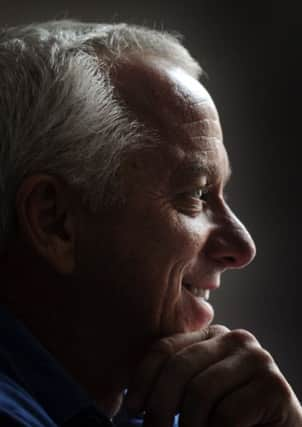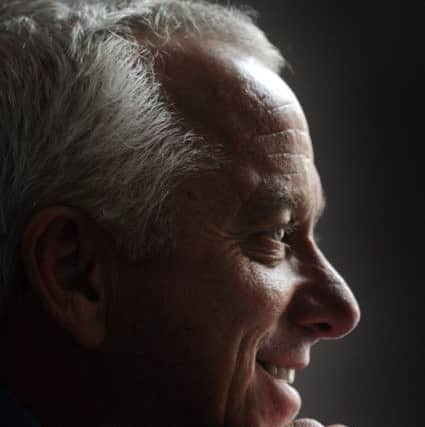LeMond – the man who would not bow down


That man is Greg LeMond, who, as a lone cyclist on Yorkshire’s roads, will have been unrecognisable to most.
He has lost the svelte figure of a professional cyclist, replaced instead with a muscular frame, while the blond hair has thinned and whitened.
Advertisement
Hide AdAdvertisement
Hide AdPerhaps most undistinguishable, though, from the LeMond of his heyday, or certainly the LeMond of the last decade, is that he will have had a smile on his face.


For Greg LeMond, the first American to win the Tour de France, is falling back in love all over again with the race, and the sport, that made him famous.
A very public divorce from the second American to claim the yellow jersey in Paris, Lance Armstrong, left LeMond chastened and ostricised.
He lost trust in the sport, and its leaders, who turned a blind eye to the serial doping by Armstrong, and for that he became an outcast.
Advertisement
Hide AdAdvertisement
Hide AdFrom the turn of the millennium to the end of 2012 and the unveiling of Armstrong as the greatest cheat in sports history, LeMond was castigated for casting doubt over the authenticity of Armstrong’s accomplishments.
He got into legal disputes over business enterprises in which the two had vested interests, and suffered personal humiliation at the hands of the Armstrong propaganda machine.
LeMond was cast so far into the shadows, he thought he might never emerge.
“It was a period that I dealt with for over 10 years and it did some damage in terms of enthusiasm for the sport, and it needed him to fall,” says LeMond, who, in the Marriott Hotel in Leeds ahead of the Grand Départ, looks at peace with it all.
Advertisement
Hide AdAdvertisement
Hide Ad“He hijacked the sport for 10 years, he and his agent and his team. They really wanted to end up owning the sport.
“They were trying to hide things, but more than that it was a bigger business going on.
“I was privvy to too much information, which I wish I wasn’t. I was told stuff in 1999, 2000 and it just came to a point where I thought, ‘I can’t watch this’. I couldn’t back the sport, knowing what I knew.
“When I was asked about it I couldn’t go out there and say this is an authentic comeback and authentic victories.”
Advertisement
Hide AdAdvertisement
Hide AdLeMond refused to lie when he was asked, as America’s cycling pioneer, to applaud the merits of his heir to the throne.
More than most, he faced the full force of the Armstrong lie for standing by his morals, and it could have ruined lesser men.
But, as a three-time winner of the Tour de France, the cheating by not only Armstrong, but a large portion of the peloton at that time, cut him deeply.
Advertisement
Hide AdAdvertisement
Hide Ad“Lance was toxic for the sport. And everybody thought he was great,” says LeMond. “It’s a dangerous thing to build up a sport around one person. The Tour de France is more than just the riders, it makes the riders; we were just actors.
“The fact that I got to ride the Tour de France and do well in it is how I became known. It’s not the other way around – I didn’t make the Tour de France famous.
“And those roles were reversed, so it’s good for the sport now that we’re out of that period.
“I would have had a real hard time coming back before. It’s not about the individual riders, it’s the way riders were treated like criminals, and how Armstrong got away with it.
Advertisement
Hide AdAdvertisement
Hide Ad“It was the hypocrisy that I didn’t like. There was pressure from the teams and pressure from the sport.
“The problems in cycling started at the top and the top was the UCI (Union Cycliste Internationale). If you’re going to set an example it has to be the UCI that sets it; it’s not the riders, it’s not the race organisers, it’s those who regulate the sport.”
LeMond has returned from his self-enforced exile on a plot of land in Minnesota because he believes the sport is finally heading back in the right direction. Like anyone who talks about cycling, he appreciates that doping will never completely be eradicated, because, in life, people cut corners.
What heartens him, though, is the transparency.
“I watched the World Cup and the president of FIFA said doping doesn’t exist. They don’t test, so how do they know?” he asks.
Advertisement
Hide AdAdvertisement
Hide Ad“The one thing I can say about cycling is it is truly the most controlled sport. They’re doing real tests and they catch people.
“You can have a great image by not testing, you can pretend it’s not there. The problem in many sports is that doping is connected to organised crime, and in other sports it’s never been exposed.
“Cycling has been more open than any sport, so, therefore, more vulnerable to critics, but that’s good.
“People identify cycling with individuals and people want to see authentic victories. I don’t believe those who say they just want to see people going fast.
Advertisement
Hide AdAdvertisement
Hide Ad“Spectators don’t demand that, teams and sponsors might. But the sport is not popular because of people going fast.
“They watch the sport because of its tactics, its strategy, because it’s about human suffering.”
In Brian Cookson, Britain’s new president of the UCI, LeMond sees, and hopes, the sport has a leader to take it forward, without turning a blind eye to the cheating.
“People cheat in life,” he says. “It’s human nature to challenge the rules; there are always going to be a percentage of people who think rules don’t apply, and that’s who you have to deal with.
Advertisement
Hide AdAdvertisement
Hide Ad“I had a hard time with that growing up, realising that people don’t play by the rules – maybe I’m a little naive.”
What he is, is an astute observer, something he will bring to the Eurosport booth over the next three weeks as he commentates on what he now sees as a cleaner peloton.
“I look at consistency of a performance, there is a science today that shows us that these outputs are in the realm of normal,” he says.
“And that’s positive, in the right sense of the word. I see riders are suffering, they are riding at different speeds. Ten years ago, the peloton was at one speed and it was obvious to see.
Advertisement
Hide AdAdvertisement
Hide Ad“The last couple of years I’ve seen dramatic change in how a peloton stays together, how it breaks up. As a racer, you know you are seeing people who are clean, they are human. And this is an exciting time for cycling.”
It is also an exciting time for LeMond. Together with his wife Kathy, they will travel the full three weeks of the Tour.
The pair have been enchanted with Yorkshire and how it has embraced the Tour de France, the kind of open-armed welcome that has helped rekindle the passion in LeMond.